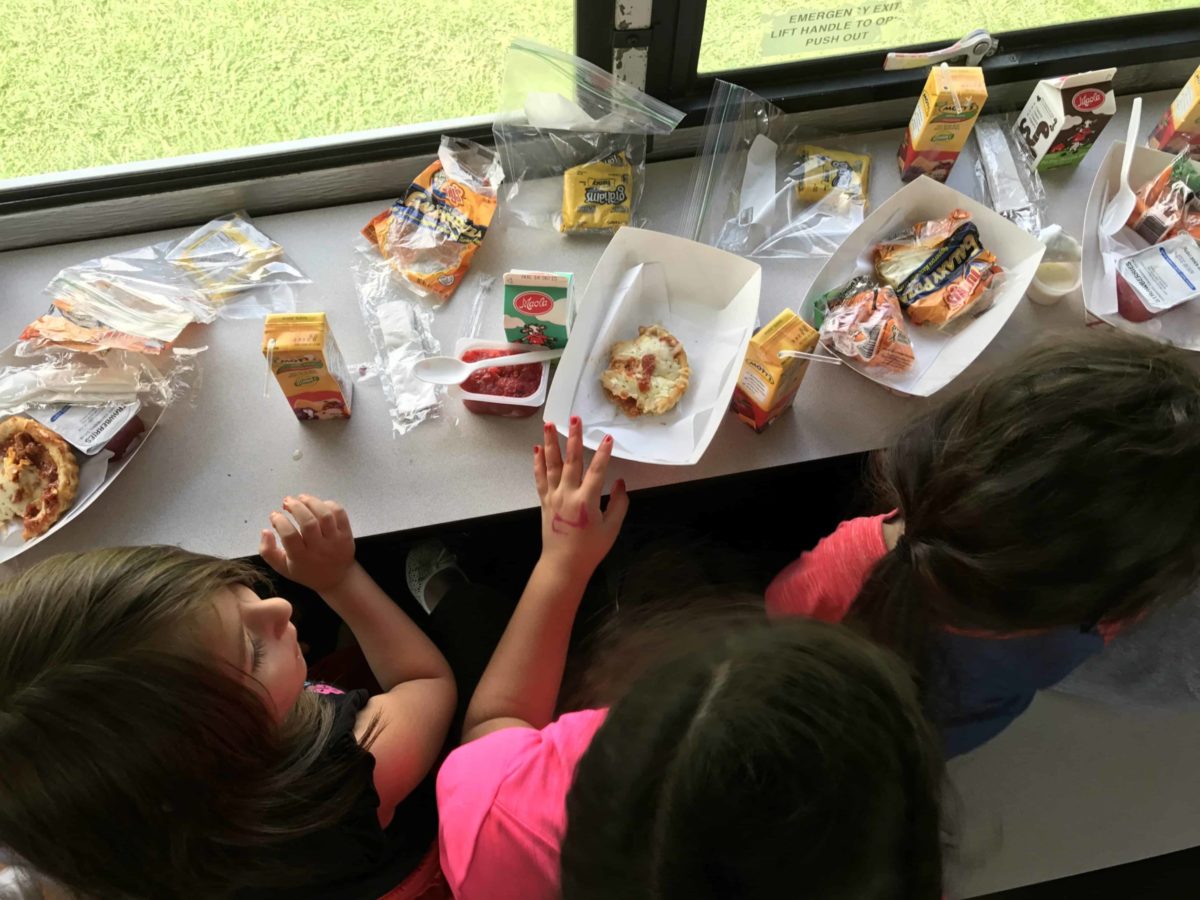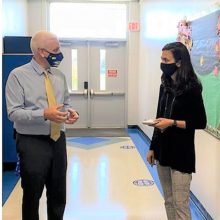Teachers from at least 38 closed school districts are preparing to rally in Raleigh tomorrow for higher pay and better working conditions. When school districts close, school nutrition services also close their doors, so administrators and organizations across the state are working to ensure the more than 500,000 students who eat free- and reduced-price breakfast and lunch in those districts still have food on the table.
Schools opening for meals
Many schools districts across the state are opening up select school cafeterias and community sites to serve at least one meal at no cost to any child on Wednesday.
Since the National School Lunch Program cannot be used for meal reimbursements on days when school is closed, Durham Public Schools is offering meals at 13 sites via an extension of the Summer Food Service Program, said Jim Keaten, executive director of school nutrition for Durham Public Schools. At these school sites, the district will offer both breakfast and lunch starting at 7:30 and 11 a.m., respectively.
“We are providing 1,000 meals at each of the 13 sites and are encouraging anyone from ages one to 18 to eat at any site. They don’t have to be Durham Public Schools child,” said Keaten. “Every child eats for free.”
Keaten said this unexpected closure comes at a large cost to school nutrition departments, who operate as financially independent entities from the school system.
“By closing for a day, [Durham] school nutrition loses about $100,000. We still have to pay all of our staff, and they aren’t working, but they shouldn’t be penalized — so the staff have to use annual leave,” said Keaten.
That $100,000 loss comes from losing the federal reimbursement money that school nutrition services receive per meal served, and from staff time. The estimate does not include any food loss, as the food intended for the 16th will be served another day.
Keaten estimates that Durham Public Schools school nutrition services provide meals to about 22,000 students per day, including any combination of breakfast, lunch, and after school snacks.
If Durham Public Schools serves all 13,000 breakfasts and 13,000 lunches, Keaten estimates they could make up about $85,000 of the lost $100,000 due to reimbursements per meal.
To find plans for May 16 for some of the other districts, follow the links below.
- Chapel-Hill Carrboro City Schools, Durham Public Schools, and Wake County Public Schools
- Winston-Salem/Forsyth County Schools
- Guilford County Schools
- Buncombe County Schools
- Asheboro City Schools
- Union County Public Schools
- Rowan-Salisbury School System
- New Hanover County Schools
Filling the remaining meal gap
While many school districts will have specific schools open for breakfast and lunch, transportation and other barriers may prevent students from accessing these meals as buses will not run that day. Nonprofit organizations and community members across North Carolina are mobilizing their resources to fill the meal gap.
In Durham County, the Durham Association of Educators along with the North Carolina Council of Churches are leading an effort to deliver packages of food to students across the district who may be at risk of going hungry on the 16th.
Through this collaboration, various organizations including the YMCA, churches, nonprofits and student groups are “adopting” schools across the district. This allows those smaller organizations to work closely with the schools in order to determine just how many students need food for the 16th.
Last week, this partnership purchased supplies and packaged roughly 1,100 bags of food to deliver to students ahead of schools being closed tomorrow. The bags include items like oatmeal packets, ravioli, and fresh fruit.
Distribution of the bags will vary from school to school. At schools like Merrick-Moore Elementary, where almost every student is covered on free and reduced lunch, the bags will fill tables in the hallways for students to grab before they leave school on Tuesday. At Southwest Elementary, forms are going home with every student asking if they would like to receive a meal bag regardless of whether they normally eat free- and reduced-price school meals.
For Kirsten Kruhm, a Durham community member and volunteer in the meal distribution effort, this partnership is crucial to filling the meal gap. Kruhm believes language barriers, transportation barriers, and other factors may prevent the 22,000 students who receive free- and reduced-prices meals in Durham from getting to the 13 schools where meals will be served.
In Orange County, hunger relief organizations like TABLE and PORCH have increased the amount of food they put in weekly food bags that are delivered to hundreds of children in Chapel Hill-Carrboro City Schools.
When Chapel-Hill Carrboro City Schools announced plans to close on May 16th, the staff at TABLE, a nonprofit based in Carrboro, jumped into action. TABLE delivers bags of both fresh and shelf-stable foods to more than 650 students every Thursday.
On May 10th, all of the bags delivered to TABLE’s students were packed with extra food and a note that explained the extra food was to cover lunch on the 16th. According to Ashton Tippins, executive director at TABLE, the organization used about $1,200 of their cash funds to purchase apples, tuna, crackers and milk from a local grocery store.
PORCH, a nonprofit based in Chapel Hill, delivers bags of fresh and shelf stable food to 400 families in the area. PORCH procures the majority of its food via food drives in 160 neighborhoods throughout the Chapel Hill and Carrboro region.
In advance of the rally day, PORCH staff included a note during their regular food drives asking for extra donations to cover the students who will be out of school on Wednesday. The food bags delivered to students this week will be packed with extra food such as pouches of tuna and bowls of cereal.
For Susan Romaine, one of the directors of PORCH, this presents the perfect example of a community that steps up to fill a specific need.
“Some people can say all this work just for one day out of school, but I think of it as an educational opportunity. Every single day, especially in the summer, kids aren’t in school,” said Romaine. “Those families that are in extreme poverty live with this every single day when kids aren’t in school. It is a reminder that there is unfortunately so much poverty in our community and the problem won’t go away after the day of advocacy.”
In Guilford County, Backpack Beginnings is delivering 900 bags of food to 21 schools today ahead of students being out of school tomorrow.


“Guilford Schools decided they are opening some schools for lunch, but we will still be supporting students for breakfast and dinner. When you lose the transportation, a lot of students won’t be able to access the school for lunch,” said Parker White, founder of Backpack Beginnings. “This meal will sustain them and help them get back to school Thursday.”
In the western region of the state, Manna FoodBank serves as the primary hunger relief organization, providing roughly 5,200 students with emergency hunger relief across a 16-county service area through the MANNA Packs for Kids program. Inside the packs of food that were distributed on Friday, an extra entree was included to cover the food gap for students who may be out of school tomorrow.



